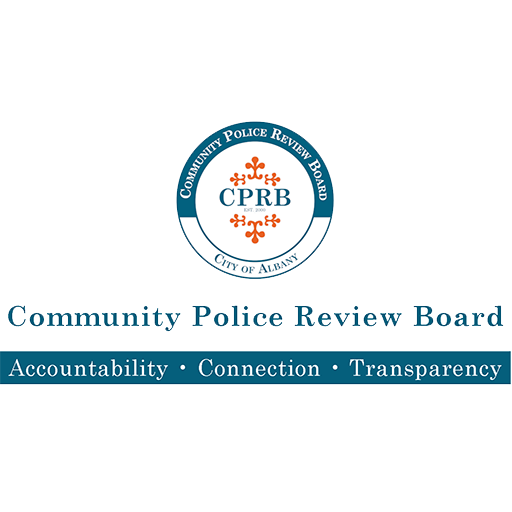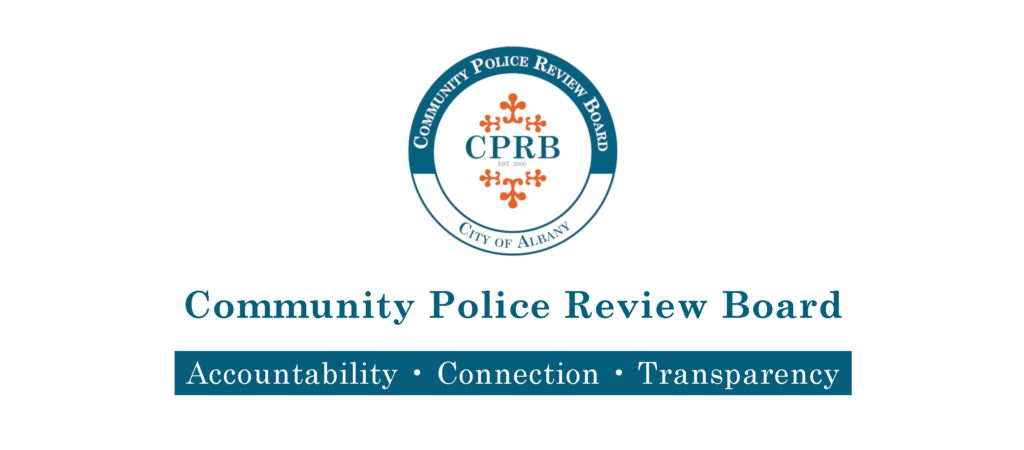What is the Community Police Review Board (CPRB)?
The Albany Community Police Review Board (CPRB) independently reviews and investigates complaints of alleged misconduct committed by officers of the City of Albany Police Department (APD) in Albany, NY.
Is the Community Police Review Board (CPRB) a part of the Albany Police Department?
No, the CPRB is not. The CPRB is an impartial agency that has been independent of the police department since 2000. The CPRB is staffed by civilians, and it is not part of the APD.
What is the difference between the Community Police Review Board (CPRB) and the Office of Professional Standards (OPS)?
The OPS is a unit within the police department, staffed by police officers. The OPS maintains a dual role of internal investigations and inspectional services, with the renewed responsibility of assisting supervisory personnel with performance evaluations. The commander, heads the Office of Professional Standards and six Detectives are assigned. The unit reports directly to the Chief of Police.
The CPRB is a completely separate agency from the police department. The CPRB is staffed by civilians and has a mandate to reviews and investigates complaints of alleged misconduct committed by officers of the Albany Police Department (APD).
How do I file a complaint?
If you have experienced or witnessed potential misconduct by a member of the Albany Police Department (APD):
- Fill out the complaint online or download a paper form
- Send your signed complaint form via email to [email protected]
- Mail the paper copy to Albany Community Police Review Board via Government Law Center, Albany Law School, 80 New Scotland Ave, Albany, NY 12208.
- NOTE: The CPRB is moving to a new location in January 2025: 175 Central Avenue, 5th Floor, Albany, NY 12206. To ensure that your complaint is received in a timely manner, we recommend submitting your complaint using our online form or via email to [email protected]
The Complaint Form is available in English or Spanish:
Can I file an anonymous complaint?
You can file an anonymous complaint if you witnessed or were directly involved in an incident. If you choose to be anonymous, we will not be able to contact you with potential follow-up questions or provide you with any information about the case. If you would like our office to follow up with you, please be sure to provide your first and last name, phone number, and/or email or mailing address.
Why is filing a complaint beneficial for the community?
Findings from your complaint can be used to influence APD policy.
Where do I get a complaint form?
You may download a copy of the complaint form from this site or obtain one at any of the following locations:
Albany City Clerk’s Office City Hall, Room 202
Albany, NY 12207
Phone: (518) 434-5090
Albany Community Development Agency*
200 Henry Johnson Blvd., 2nd Fl. Suite #1
Albany, NY 12210
Phone: (518) 434-5240
Albany Housing Authority*
200 South Pearl St.
Albany, NY 12202
Phone: (518) 641-7500
Albany Public Library (all branches). Click here for branch locations.
Center for Law & Justice, Inc.*
153 South Pearl Street, 2nd Fl.
Albany, NY 12202
Phone: (518) 427-8361
New York Civil Liberties Union*
90 State St., Suite 518
Albany, NY 12207
Phone: (518) 436-8594
Albany Police Department’s Office of Professional Standards*
200 Henry Johnson Blvd.
Albany, NY 12210
Phone: (518) 462-8017
Albany Police Department–Center Station
536 Western Ave.
Albany, NY 12203
Phone: (518) 458-5660
Albany Police Department – North Station
170 Henry Johnson Blvd.
Albany, NY 12210
Phone: (518) 462-8684
Albany Police Department – South Station
126 Arch St.
Albany, NY 12202
Phone: (518) 462-8050
Albany Police Department – West Station
223 Washington Ave. Ext.
Albany, NY 12205
Phone: (518) 458-9148
Who can help me fill it out?
The above organizations marked with an asterisk (*) have agreed to provide assistance with filling out complaint forms.
If I am in jail, do I have the right to file a complaint?
Yes, you have that right; it doesn’t matter whether or not you are currently incarcerated. Our investigator can visit city or county jails in order to interview complainants.
Can I file a complaint without the officer’s name and badge number?
Yes. We often get complaints against unidentified officers. In most of these cases, our investigators or APD detectives are able to identify the officer using police department records and documents. We may need to interview you a second time and have you view officer photos to make a positive ID.
How will I know if the CPRB received my complaint?
You will receive a letter from the Board notifying you that your complaint has been received.
What happens after I file a complaint?
You will receive a letter from the Board notifying you that your complaint has been received.
Staff at the CPRB and APD Office of Professional Standards (OPS) will determine if it falls within the CPRB’s jurisdiction. If your complaint is not in our jurisdiction, it is referred to the appropriate agency or entity to investigate the incident. If it is within our jurisdiction, you will receive a letter from the CPRB informing you of our next steps.
Jurisdiction
The CPRB has the authority to review or investigate complaints of alleged misconduct committed only by members of the APD. Complaints against members of police departments other than the APD must be filed with the appropriate local or state authority.
How are complaints resolved?
The CPRB determines whether complaints are appropriate for monitoring, investigation, or mediation.
Monitor
If the complaint is determined appropriate for review, the APD Office of Professional Standards (OPS) will lead the investigation. The CPRB can assign a monitor to observe and monitor the OPS investigation of a complaint if the allegation involves excessive force or civil rights violation.
Investigation
A CPRB investigation is a comprehensive way to gather evidence about allegations of police conduct within the CPRB’s purview and prepare reports for action by the Board. The CPRB investigators gather as much evidence as possible, including obtaining video evidence and statements from witnesses and officers.
An investigation can take several months to complete. Your cooperation, which will involve answering questions and giving a complete statement about the incident, is vital. When the investigation is complete, the CPRB makes a determination of whether the officer violated APD policy.
Mediation
Mediation provides an opportunity for civilians and police officers to meet in a safe, quiet, and private space with a trained and impartial mediator to talk confidentially about what happened. Mediation is a voluntary process—all parties must agree to participate. You can request mediation on your complaint form.
Why isn’t my statement about what happened enough for the CPRB to determine that the officer committed misconduct?
We are required by law to conduct reviews or investigations that are thorough and fair. This means we must gather all possible evidence and information pertaining to the incident that prompted your complaint, not just your statement. This entails interviewing the subject officer, interviewing people who may have witnessed the incident, looking at the video when it exists, examining medical records when there are injuries, and much more.
There are many cases where an officer’s actions prompt a complaint, yet those actions are within the law and within police department policies. This emerges when we or APD investigate fully, and in such a case, the officer will be exonerated.
Other times, a complaint is substantiated, based upon the preponderance of evidence. Substantiated cases are referred to the police department for discipline.
How long does it take to complete a full investigation?
Every case is different. Sometimes, an investigation can be done quickly, in a matter of a few months. Some investigations take longer. It depends on many things, such as the availability of witnesses and the complexity of the incident, including the number of alleged victims and subject officers.
Do complaints remain on an officer’s record?
Yes. Regardless of the outcome, all complaints remain on an officer’s CPRB history, which is part of their personnel record at the police department. This includes complaints that are resolved through our mediation program.
Can I meet with the officer to discuss what happened?
Yes. If your case is suitable for CPRB’s mediation program, you may have the chance to have a confidential discussion with the officer about the incident, with the assistance of a neutral mediator.
What if the police officer retaliates against me for filing a complaint?
If you believe the APD is retaliating against you for filing a complaint with the CPRB, notify us immediately. The CPRB refers all complaints of retaliation to the APD’s Office of Professional Standards (OPS); however, if the conduct alleged in the retaliation complaint is determined to fall within the CPRB’s jurisdiction, we will generate a new complaint and open an investigation into the alleged retaliation in addition to the OPS referral.
How will I know when my complaint is being reviewed at a Board meeting?
You will receive a letter from the CPRB notifying you that the Board will review your complaint. In the letter, you will be provided with the date, time, and location of the monthly meeting in which your complaint is scheduled to be reviewed, and you will be given an opportunity to attend the meeting, listen to the presentation, and comment on your complaint.
Does the CPRB discipline officers?
No. If the CPRB determines that an officer committed misconduct, it recommends discipline, ranging from verbal warning to termination from the APD for the most serious violations. Only the Chief of Police has the authority to decide the level of discipline and impose punishment on an officer.
Can the CPRB help me with a summons or arrest?
No, we do not have the jurisdiction. A summons or an arrest can only be resolved in court. We cannot provide any legal advice or assistance. You should seek guidance from a licensed attorney.

